
Presentation of The Report on Pressure and Control Over the Media in Serbia
The Anti-Corruption Council presented The Report on Pressure and Control over the Media, which was written based on extensive documentation collected and analyzed for several months. Based on collected data, The Report shows the existence of strong political pressure, and full control over the media in Serbia.
The Report on Pressure and Control Over the Media in Serbia
Summary of Report on pressures on & control of media in Serbia
Letter to Prime minister
The Report on Pressure and Control Over the Media was presented at the round table organized in cooperation with the Commissioner for Information of Public Importance and Protection of Personal Data, the Protector of Citizens and representatives of media associations. 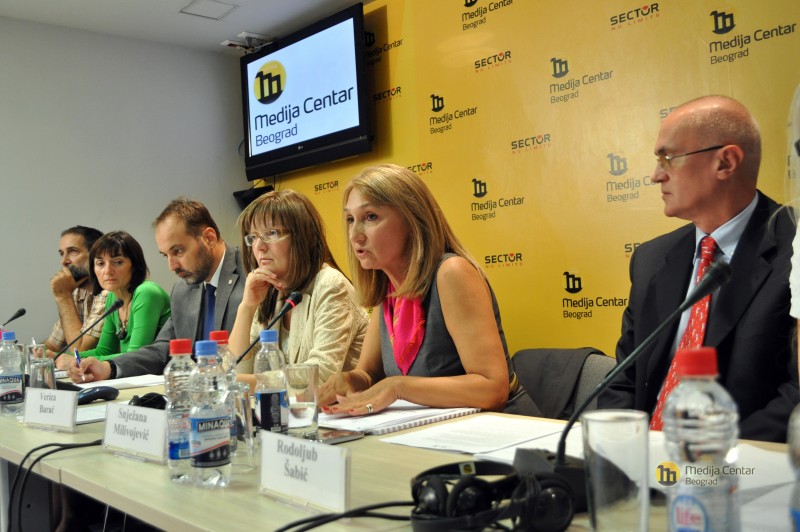
From the right: Rodoljub Sabic, the Commissioner for Information of Public Importance and Protection of Personal Data, Snjezana Milivojevic, a professor at the Faculty of Political Science, Verica Barac, the president of the Anti-Corruption Council, Sasa Jankovic, the Protector of Citizens, Ljiljana Smajlovic, the president of the Journalists' Association of Serbia (UNS), Vukasin Obradovic, the president of the Independent Journalists' Association of Serbia (NUNS).
A large number of representatives of local and international institutions, foreign embassies and journalists responded to the invitation to participate in the discussion at the Belgrade Media Center.
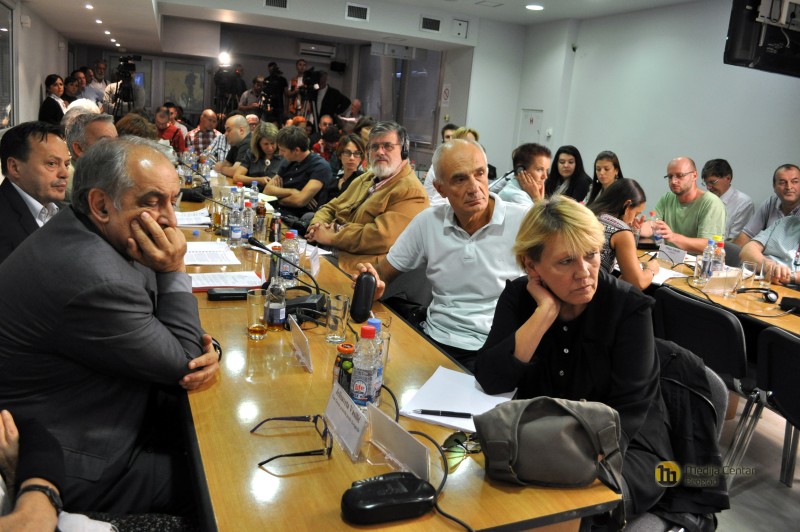
At the beginning of the meeting, Snjezana Milivojevic, a professor at the Faculty of Political Science, said that she had accepted to participate in the meeting and assist the efforts of the Council to open this topic to the public, because this was the first time for her to read an understandable report and she was "shocked by what she understood." She noted that the Council's Report shows those processes which held the media in Serbia captured.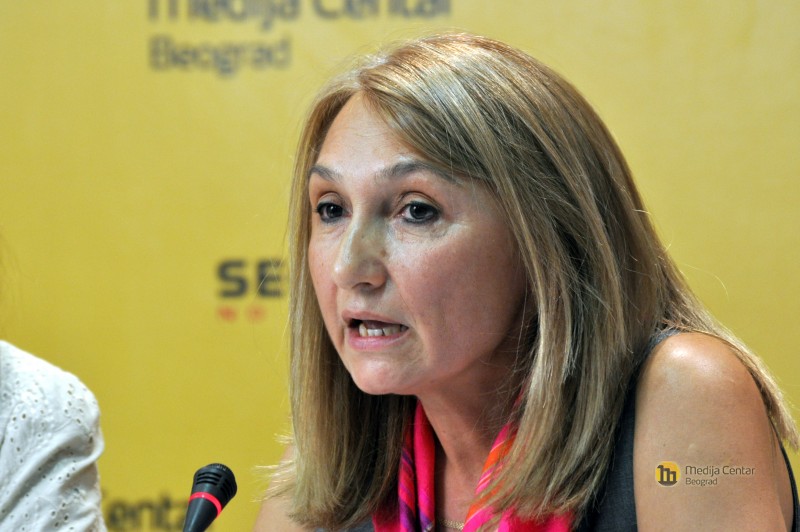 "The Report shows something very indicative in the state's working relation towards the media," said Snjezana Milivojevic. She experienced the report as a "media crime story", and she was surprised by how complex and subtle processes that surround money flows in today's media sphere are.
"The Report shows something very indicative in the state's working relation towards the media," said Snjezana Milivojevic. She experienced the report as a "media crime story", and she was surprised by how complex and subtle processes that surround money flows in today's media sphere are.
These flows of money are of great importance, because the government has learnt that it is not possible to achieve the direct political influence, and that the power is transformed into economic just to be used again as political, which is one very complicated process that must be traced, explained Snjezana Milivojevic, and added that the Council has shown great courage to correlate all these processes with the content that is published. Snjezana Milivojevic invited roundtable participants to support the Council's efforts to open a conversation about the connection between the state and the media, and about the state's influence through political and economic channels.
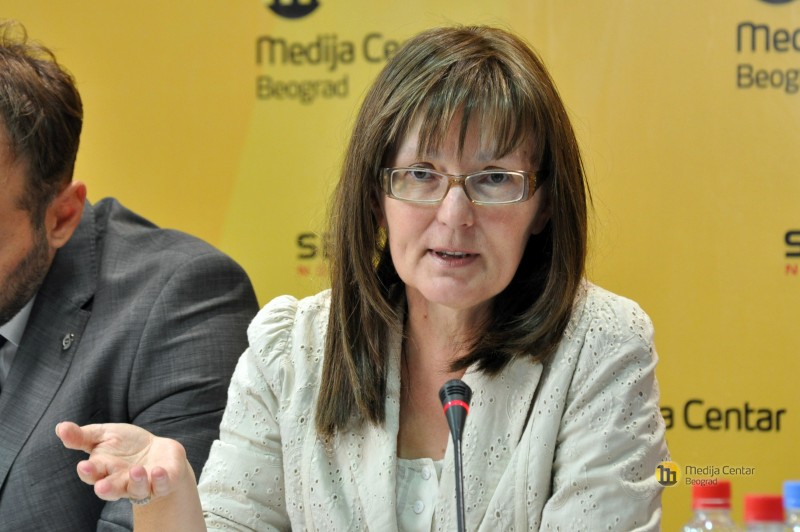 Verica Barac, the president of the Anti-Corruption Council, thanked everyone who responded to the invitation, because there is a great need to talk about problems that are accumulating more and more. She said that media freedom in Serbia is called into question, which directly puts the fight against corruption under threat. Without the help of free media there is no fight against corruption. Verica Barac explained that the Council has been analyzing the situation in the media for a long time, and that there were a lot of problems with the collection of documentation required from the Radio Television of Serbia (RTS).
Verica Barac, the president of the Anti-Corruption Council, thanked everyone who responded to the invitation, because there is a great need to talk about problems that are accumulating more and more. She said that media freedom in Serbia is called into question, which directly puts the fight against corruption under threat. Without the help of free media there is no fight against corruption. Verica Barac explained that the Council has been analyzing the situation in the media for a long time, and that there were a lot of problems with the collection of documentation required from the Radio Television of Serbia (RTS).
She noted that the Council has not received most of these documents, despite the decision of the Commissioner for Information of Public Importance and Protection of Personal Data, because RTS, rather than provide the documentation, decided to pay a fine. The President of the Council explained that the report has been made on the basis of the documentation that was received from the ministries and the Treasury, and that on the basis of these documents the influence of the state on the media can clearly be seen. The media no longer have critical access to events and information, but only publish stories without any analysis.
Verica Barac concluded that the problem is extremely large and that in these conditions not only any fight against corruption is possible, but it is not possible to create any democratic system. She invited all to help by talking about the issue and said that the Report of the Council should be only the beginning of further joint work on this big problem.
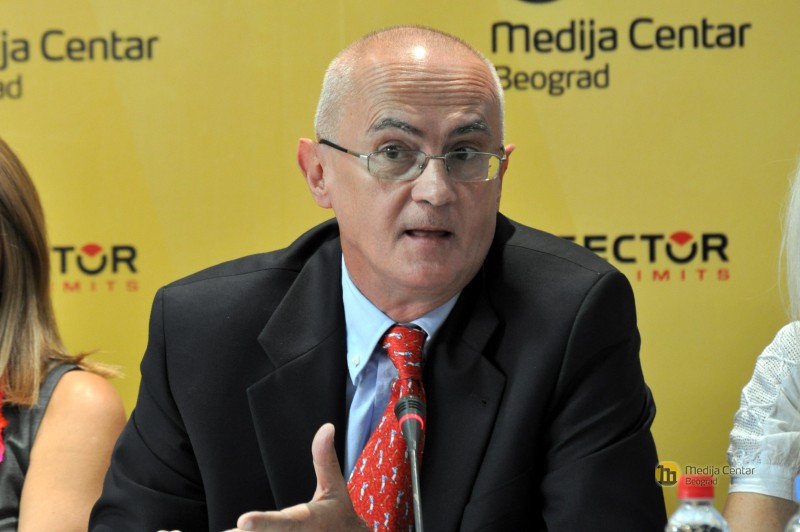 Rodoljub Sabic, the Commissioner for Information of Public Importance and Protection of Personal Data said that after the facts presented in the Report, which is not possible to bring into question, every story about the transparency of ownership on media in this society becomes frivolous. "This degree of fulfillment of transparency of ownership on media is a caricature," explained Sabic . He said that the question of the impact of state institutions on the media is crucial. Sabic criticized the financing of certain media from the budget, adding that it is unacceptable that taxpayers' money is used for personal and party promotion. That problem is, in his opinion, the central issue in the Council’s report.
Rodoljub Sabic, the Commissioner for Information of Public Importance and Protection of Personal Data said that after the facts presented in the Report, which is not possible to bring into question, every story about the transparency of ownership on media in this society becomes frivolous. "This degree of fulfillment of transparency of ownership on media is a caricature," explained Sabic . He said that the question of the impact of state institutions on the media is crucial. Sabic criticized the financing of certain media from the budget, adding that it is unacceptable that taxpayers' money is used for personal and party promotion. That problem is, in his opinion, the central issue in the Council’s report.
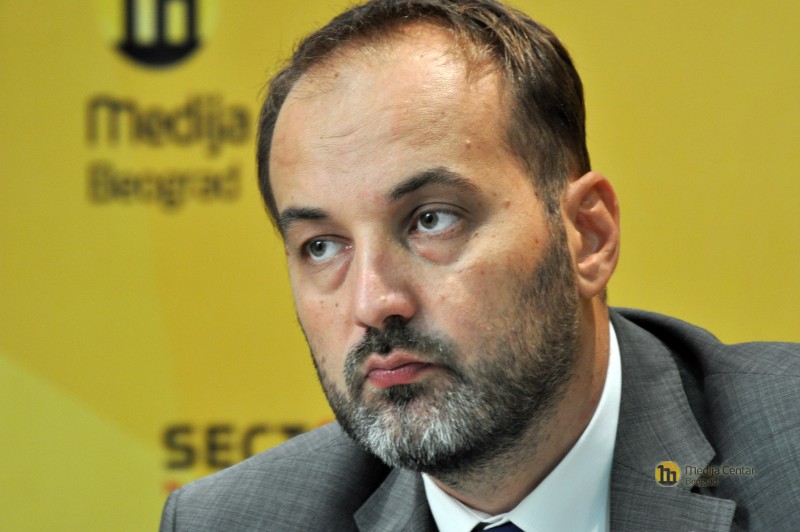 The Protector of Citizens, Sasa Jankovic stated that free media are a precondition for the achieving of political rights of citizens. The right to choose is only possible if you have information on which you can make a decision, and the media are the ones who have taken a public role to provide that information to citizens, to explain, analyze, interpret in various ways, but always so that the citizen has minimum basis to conclude on the quality and objectivity of the information, explained Jankovic. To accomplish this role the media must respect certain rules. This Report has shown that some of the fundamental rules of the Serbian society are not placed in a proper way, Jankovic said, and concluded that it is important to talk about what it is that people lose because all of the information placed by the media is not sufficiently objective and that citizens are not familiar with the background of placed information.
The Protector of Citizens, Sasa Jankovic stated that free media are a precondition for the achieving of political rights of citizens. The right to choose is only possible if you have information on which you can make a decision, and the media are the ones who have taken a public role to provide that information to citizens, to explain, analyze, interpret in various ways, but always so that the citizen has minimum basis to conclude on the quality and objectivity of the information, explained Jankovic. To accomplish this role the media must respect certain rules. This Report has shown that some of the fundamental rules of the Serbian society are not placed in a proper way, Jankovic said, and concluded that it is important to talk about what it is that people lose because all of the information placed by the media is not sufficiently objective and that citizens are not familiar with the background of placed information.
The president of the Journalists' Association of Serbia (UNS), Ljiljana Smajlović said that the Council's Report showed that the Serbian media are not allies of society in the fight against the corruption, what they should be, but state's accomplices in one corruption game. 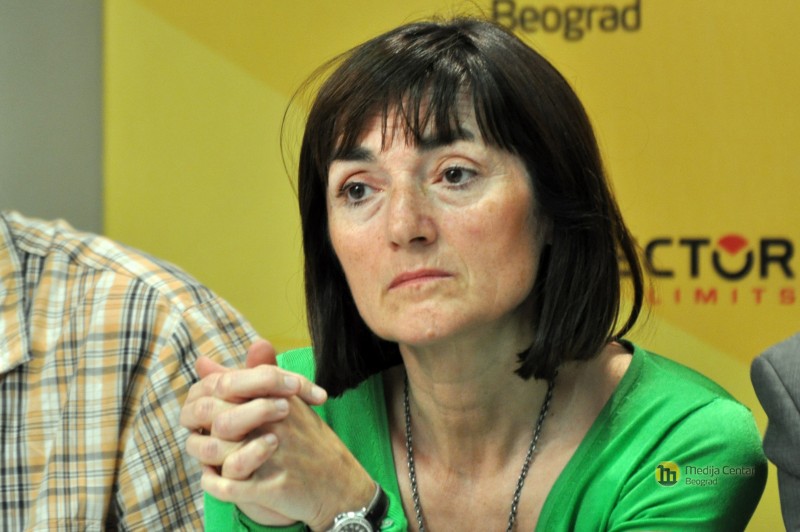 She added that she would like UNS presented such a report; after reading it she asked herself how it's possible for a poor country to spend 40 million euros, not for "tough and critical press" , but for purchasing the false researches in the media and gaining publicity and reputation, voices and advertising space for party and political officials, and all by using state and public institutions and their money. Smajlovic said that she is particularly interested in whether the Serbian government will discuss this Report, and asked if we'll find out what the government knows, and if this, what we read in the Report, is the strategy adopted by the government in yesterday's telephone session, and whether they intend to change something in the way of spending the public money in the media.
She added that she would like UNS presented such a report; after reading it she asked herself how it's possible for a poor country to spend 40 million euros, not for "tough and critical press" , but for purchasing the false researches in the media and gaining publicity and reputation, voices and advertising space for party and political officials, and all by using state and public institutions and their money. Smajlovic said that she is particularly interested in whether the Serbian government will discuss this Report, and asked if we'll find out what the government knows, and if this, what we read in the Report, is the strategy adopted by the government in yesterday's telephone session, and whether they intend to change something in the way of spending the public money in the media.
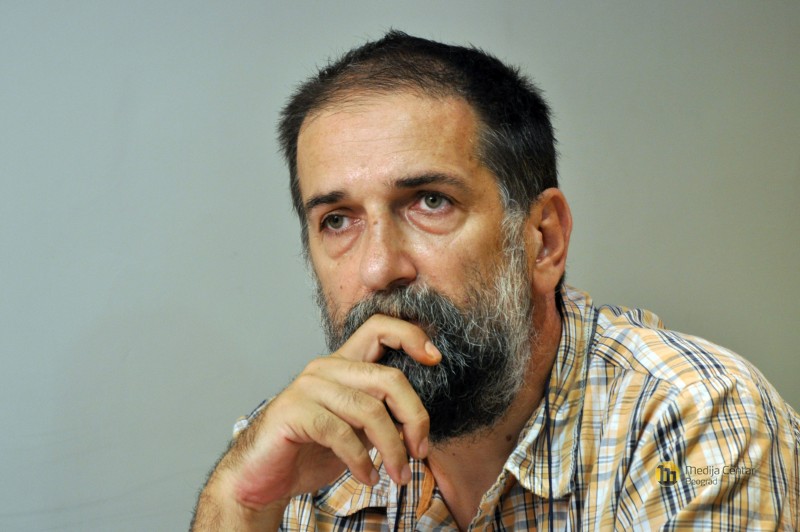 The president of the Independent Journalists' Association of Serbia (NUNS), Vukasin Obradovic said that the answers to all the questions asked at the meeting, we will get in today and tomorrow's published comments in different media. "We need to stop being hypocrites, and surprise over the content of the Report, because anyone remotely informed knows how everything works, but only Ms. Barac and the Anti-Corruption Council collected data and the courage to present them to public", Obradovic said. He wonders whether we can speak of an independent, professional and investigative journalism after these data given in the Council's Report. "This report is actually a sad story of Serbian journalism and journalists, who are placed in a position to accept all sorts of blackmail", concluded the President of NUNS.
The president of the Independent Journalists' Association of Serbia (NUNS), Vukasin Obradovic said that the answers to all the questions asked at the meeting, we will get in today and tomorrow's published comments in different media. "We need to stop being hypocrites, and surprise over the content of the Report, because anyone remotely informed knows how everything works, but only Ms. Barac and the Anti-Corruption Council collected data and the courage to present them to public", Obradovic said. He wonders whether we can speak of an independent, professional and investigative journalism after these data given in the Council's Report. "This report is actually a sad story of Serbian journalism and journalists, who are placed in a position to accept all sorts of blackmail", concluded the President of NUNS.
The discussion that followed included Dragan Janjic (NUNS), Dragana Nikolic-Solomon (OSCE), Slavoljub Kacarevic (Balkan Magazine) and others; it was concluded that the Report is a good starting point for considering the obstacles to media freedom and creating a democratic public in Serbia.
The participants supported the findings and recommendations of the Council, particularly noted:
- The Council's Report exactly defined the mechanisms and extent of control of the media in Serbia. It is necessary to ensure that all the data become available to the general public. Representatives of the institutions that participated in the organization of the roundtable will make effort to use the Council's Report in further appearances as a starting point for analysis of the problem of lack of freedom of the media and thereby contribute legal and other solutions to be directed in accordance with the actual situation of the media in Serbia.
- Institutions and the media who participated in the round table will cooperate in monitoring the implementation of recommendations from the Report. The implementation of these recommendations can significantly contribute to the improvement of media freedom and the democratic public, which is why the round table participants will try to put pressure on relevant institutions to clearly identify themselves.
- Considering the alarming data about the extent of funds from the budget given to the Serbian media, among the measures proposed by the Council, it is necessary to establish a model of public procurement of media services that will prevent direct budget financing of current operations of the media close to the authorities; media should be granted funds only for activities of public interest based on clearly defined and transparently implemented proposals.
Roundtable in the Media Center was attended by representatives of the Media Department of the OSCE mission in Serbia, 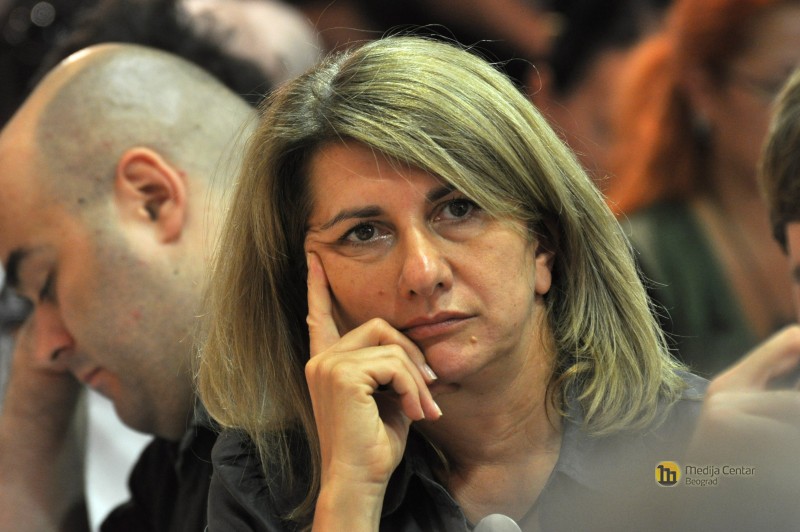 the EU Delegation in Serbia, representatives of embassies of the Netherlands, Federal Republic of Germany, the Kingdom of Sweden, the United Kingdom of Great Britain. The meeting was attended by representatives of the Anti-Corruption Agency, the State Audit Institution, the Commission for Protection of Competition. Despite the invitation, the representatives of the Republic Broadcasting Agency (RRA), the Republic Agency for Electronic Communications (RATEL), Jelena Trivan, the Chairperson of the Culture and Information Committee in the National Assembly of the Republic of Serbia, and Dragana Milicevic Milutinovic, Secretary of State for information and media in the Ministry of Culture, Media and Information Society, did not appear.
the EU Delegation in Serbia, representatives of embassies of the Netherlands, Federal Republic of Germany, the Kingdom of Sweden, the United Kingdom of Great Britain. The meeting was attended by representatives of the Anti-Corruption Agency, the State Audit Institution, the Commission for Protection of Competition. Despite the invitation, the representatives of the Republic Broadcasting Agency (RRA), the Republic Agency for Electronic Communications (RATEL), Jelena Trivan, the Chairperson of the Culture and Information Committee in the National Assembly of the Republic of Serbia, and Dragana Milicevic Milutinovic, Secretary of State for information and media in the Ministry of Culture, Media and Information Society, did not appear. 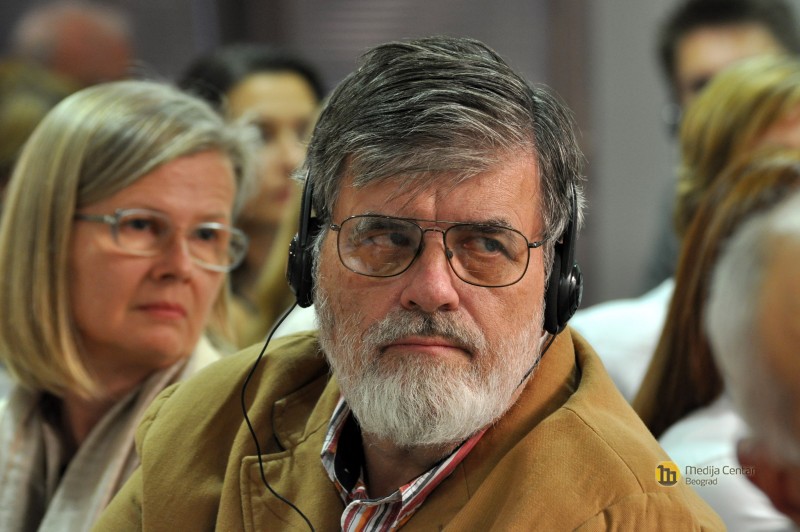 Discussion about the Report, was attended by a number of non-governmental organizations and associations such as IREX (International Research and Exchanges Board), AEI (Association for European IntegrationS), USAID, and Doctors Against Corruption.
Discussion about the Report, was attended by a number of non-governmental organizations and associations such as IREX (International Research and Exchanges Board), AEI (Association for European IntegrationS), USAID, and Doctors Against Corruption.
The presentation of the Report was attended by many journalists, as well as 15 journalists' teams: B 92, Politika, agencies Beta, Tanjug and Fonet, the daily paper Danas , the Frankfurt news, the Balkan Magazine, Infobiro, Republika, Kurir, Pink, PG Network , RTS, Media Centre Sarajevo. In spite of the presence of so many teams, just as the president of NUNS Vukasin Obradovic predicted in his speech, the vast majority of the media didn't publish anything about this event. 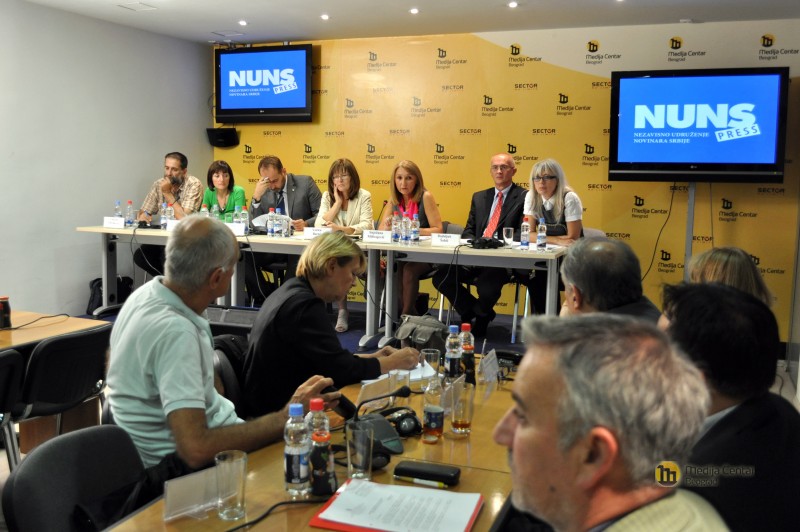 In fact, the citizens could get information about the Council's Report only in thin enclosures in the evening news broadcasts on TV B 92 and RTS, and in articles published on September 30th in the dailies Danas and Kurir, which practically confirmed the Council's Report about the alarming situation in the media.
In fact, the citizens could get information about the Council's Report only in thin enclosures in the evening news broadcasts on TV B 92 and RTS, and in articles published on September 30th in the dailies Danas and Kurir, which practically confirmed the Council's Report about the alarming situation in the media.
The Anti-Corruption Council will submit a detailed report on the discussions and conclusions of the roundtable to the Serbian government next week.
The complete recording of this event, can be downloaded from Media Center's website http://www.mc.rs/mc-web-televizija.1498.html


